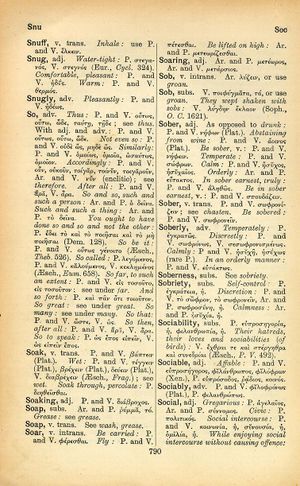so: Difference between revisions
(CSV5) |
m (Text replacement - "<b class="b2">Theb.</b>" to "''Theb.''") |
||
| Line 20: | Line 20: | ||
<b class="b2">You ought to have done so and so and not the other</b>: P. ἔδει τὸ καὶ τὸ ποιῆσαι καὶ τὸ μὴ ποιῆσαι (Dem. 128). | <b class="b2">You ought to have done so and so and not the other</b>: P. ἔδει τὸ καὶ τὸ ποιῆσαι καὶ τὸ μὴ ποιῆσαι (Dem. 128). | ||
<b class="b2">So be it</b>: P. and V. [[οὕτως]] γένοιτο (Aesch., | <b class="b2">So be it</b>: P. and V. [[οὕτως]] γένοιτο (Aesch., ''Theb.'' 526). | ||
<b class="b2">So called</b>: P. λεγόμενος, P. and V. καλούμενος, V. κεκλημένος (Aesch., <b class="b2">Eum.</b> 658). | <b class="b2">So called</b>: P. λεγόμενος, P. and V. καλούμενος, V. κεκλημένος (Aesch., <b class="b2">Eum.</b> 658). | ||
Revision as of 11:03, 7 August 2017
English > Greek (Woodhouse)
adv.
Thus: P. and V. οὕτως, οὕτω, ὧδε, ταύτῃ, τῇδε; see thus.
With adj. and adv.: P. and V. οὕτως, οὕτω, ὧδε.
Not even so: P. and V. οὐδὲ ὥς, μηδὲ ὥς.
Similarly: P. and V. ὁμοίως, ὁμοῖα, ὡσαύτως, ὁμοῖον.
Accordingly: P. and V. οὖν, οὐκοῦν, τοίγαρ, τοίνυν, τοιγαροῦν, Ar. and V. νυν (enclitic); see therefore.
After all: P. and V. ἄρα, V. ἆρα.
So and so, such and such a person: Ar. and P. ὁ δεῖνα.
Such and such a thing: Ar. and P. τὸ δεῖνα.
You ought to have done so and so and not the other: P. ἔδει τὸ καὶ τὸ ποιῆσαι καὶ τὸ μὴ ποιῆσαι (Dem. 128).
So be it: P. and V. οὕτως γένοιτο (Aesch., Theb. 526).
So called: P. λεγόμενος, P. and V. καλούμενος, V. κεκλημένος (Aesch., Eum. 658).
So far, to such an extent: P. and V. εἰς τοσοῦτο, εἰς τοσοῦτον: see under far.
And forth: P. καὶ πᾶν ὅτι τοιοῦτον.
So great: see under great.
So many: see under many.
So that: P. and V. ὥστε, V. ὡς.
So then, after all: P. and V. ἄρα, V. ἆρα.

